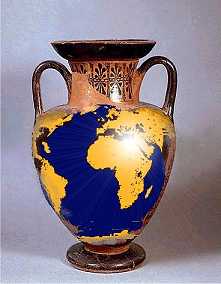|
 |
|
 |
Part I (sections 1-3) | Part II (sections 4-6) | Part III (sections 7-8)
ABSTRACT
This
long paper, the opening piece of the collection Black
Athena Ten Years After (1997, now being
reprinted as Black Athena Alive),
seeks to present an extensive critical yet constructive
assessment of Martin Bernal’s Black
Athena project. After sketching the context
of the conference on which that collection was based, it presents
a summary of the various contributions to the collective volume,
by Martin Bernal (3 papers), Wim van Binsbergen (3 papers), Jan
Best, Arno Egberts, and Josine Blok. It then sketches the
specific critical contributions which Black
Athena Ten Years After seeks to make: a
contribution largely by Dutch scholars, with several new and
illuminating pieces by Bernal himself, with a larger Africanist
imput than the Black Athena debate
had received so far, and resulting a far more constructive and
positive assessment than would have seemed possible anymore after
the dismissive critical collection Black
Athena Revisited (1996). In section 2 Martin
Barnal’s Black Athena project
is sketched against the background of his unique social and
intellectual background as a British upperclass intellectual from
a milieu of intellectual giants, finding himself in a USA
environment which is obsessed by cultural hegemony and race. The Black
Athena project is then situated ned against
the background of the growth of Near Eastern (including
Egyptological) studies since the mid-19th
century of the Common Era. The fact is stressed that
Bernal’s ideas are in continuity with much established
scholarship, his project largely popularising and politicising a
scholarly view of Greece’s (and Europe’s) cultural
indebtedness to the Ancient Near East which had been in the air
in Near Eastern Studies for half a century or more. The
implications of the Black Athenadebate
for African Studies, and vice versa, are then briefly indicated.
In section 4 the central issue is that of ideology and cultural
history, highlighting both the fact of intercontinental
interaction in the eastern Mediterranean basin in ancient times
(Neolithic and Bronze Age), and the uniqueness of ancient Greek
civilisation as a creative result of ‘transformative
localisation’ of selected cultural imports; in the process,
also the search for origins is discussed as both tempting and
dangerous, yet unavoidable in our age of identity, minorities,
multiculturalism and globalisation and scentral social and
political concerns. Section 5 contains a highly critical
discussion of what Bernal boastfully calls his sociology of
knowledge, and seeks to situate himself in a sociological context
of knowledge production – something which he has overlooked
so far. In section 6 the flow of the Black
Athenadebate is discussed in detail, and an
attempt is made to evaluate the many critical arguments levelled
against Bernal, while at the same time highlighting the many
positive reactions which his work as brought forth among
recognised specialists in the Ancient Near East history,
archaeology and linguistics. Section 7 seeks to outline the
puzzling epistemology which underlies Bernal’s work, having
been responsible for a great deal of critical confusion and
understandable rejection, especially in the light of
Bernal’s unyielding and insinuating response to serious
scholarly criticism. Here our key example is his proposed (and
untenable) etymology of the name Athena as deriving from the
Egyption Ht Nt,
‘temple of Neith’; however, this etymology may be
rejected without major harm to Bernal’s scholarly project
for which it inspired the name of ‘Black Athena’.
Characterising Bernal as a hybrid between empiricist realism and
political idealism, we identify why he is capable both of
exploding established scholarly and societal myth, and of risking
to create his own alternative myths. In the paper’s final
assessment Bernal is given praise as one of the most creative and
innovative scholars of the late twentieth century, whose seminal
ideas deserve to continue to inspire research work in a number of
fields for decades to come.
The paper:
Part I (click to open)
1. Introduction
2. Martin Bernal's Black Athena project
3. Into Africa?
Part II (click to open)
4. Ideology and cultural history
5. Martin Bernal and the sociology of knowledge
6. The Black Athena debate
Part III (click to open)
7. Martin Bernal's epistemology
8. Towards a re-assessment - and beyond
[1]Earlier versions of this argument were presented at the conference on ‘Black Athena: Africa’s contribution to global systems of knowledge’, African Studies Centre, Leiden, The Netherlands, 28 June, 1996; and at the Africa Research Centre, Catholic University Louvain, 8 November, 1996. I am indebted to Martin Bernal, Jan Best, Josine Blok, and Arno Egberts, for repeated and profound exchanges on the theoretical and empirical problems central to the present volume; to these colleagues, and to Pieter Boele van Hensbroek, Filip de Boeck, and Renaat Devisch, for useful comments; to the Netherlands Institute for Advanced Study in the Humanities and Social Sciences (NIAS), Wassenaar, where the present argument was largely conceived when I spent a fruitful and exciting academic year 1994-95 at NIAS as a member of the theme group on ‘Religion and Magic in the Ancient Near East’; and to my wife and children, without whose unconditional support this book project — modest in itself but glaringly ambitious in view of my academic background and skills, and unexpectedly difficult because of its ideological tangles — would never have been completed. For official acknowledgements see the main text.
Part I (sections 1-3) | Part II (sections 4-6) | Part III (sections 7-8)
| page last modified: 20-04-13 12:34:17 |  |
|||
 |